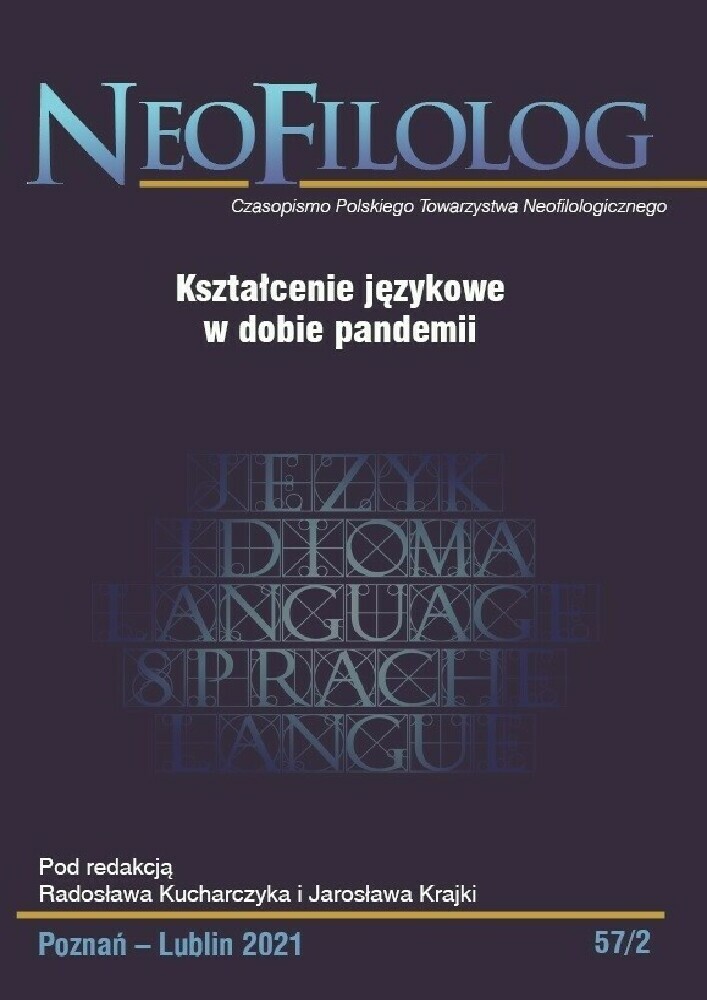Abstrakt
At the end of the first semester of the 2019/2020 academic year, we conducted an opinion survey of 50 philology students on their willingness to adopt new pedagogical approaches based largely on digital media. We measured the degree of appreciation of different forms of academic work, including lectures, tutorials and seminars, modified by these approaches. After a year of the COVID-19 pandemic, we investigated the potential revision of views on the practical application of the innovations described in 2020. Our research focused on appreciating the usefulness and effectiveness of the teaching methods analyzed during the initial research, judged through the prism of current experiences.
Bibliografia
Amyotte L. (1996), Méthodes quantitatives. Application à la recherche en sciences humaines. Québec : Éditions du Renouveau Pédagogique.
Corvet-Biron M. (2015), Les MOOCs, nouvelle vraie ou fausse bonne idée ? [en ligne], URL : https://www.speakenglishcenter.com/les-moocs-nouvelle-vraie-fausse-bonne-idee/, consulté le 9 mars 2021.
Eude T. (2021), Banque d’activités d’enseignement-apprentissage : Thierry Eude, Cours magistral en formation comodale [en ligne], URL : https://www.enseigner.ulaval.ca/ressources-pedagogiques/banque-d-activites-d-enseignement-apprentissage-thierry-eude, consulté le 2 avril 2021.
Jean S. (2021), Maintenir la concentration des apprenants durant un cours en vidéo-conférence. Quelques idées pour repenser ses interventions. [en ligne], URL : https://cursus.edu/articles/43973/maintenir-la-concentration-des-apprenants-durant-un-cours-en-video-conference, consulté le 21 mars 2021.
Grzega J., Schöner M. (2008), The didactic model LdL (Lernen durch Lehren) as a way of preparing students for communication in a knowledge society. “Journal of Education for Teaching”, 34 (3), 167–175.
Fiorella L., Mayer R. E. (2013), The relative benefits of learning by teaching and teaching Expectancy. “Contemporary Educational Psychology”, 38 (4), 281–288.
Marchand, L., Loisier, J. (2003), L’université et l’apprentissage en ligne, menace ou opportunité, « Revue des sciences de l’éducation » 29 (2), 415–437
Martin J.-P. (2004), Lernen durch Lehren : quand les apprenants font la classe. « Les Cahiers de l’APLIUT », 33 (1), 45–56.
Prensky M. (2001), Digital Natives, Digital Immigrants. “On the Horizon”, 9 (5), 1–6.
Roberge A. (2017), Les MOOC se dégonflent-ils ? Le MOOC serait-il un modèle pédagogique déjà dépassé ? [en ligne], URL : https://cursus.edu/articles/38110/les-mooc-se-degonflent-ils, consulté le 2 mars 2021.
Widła H. (2019), Implementation of IT tools as a method of improving language and communication skills of bi- and trilingual students, “International Journal of Research in E-learning”, 5 (2), 33–48.
Widła H. (2020), Évaluation formative par le biais de pratiques « Lernen durch Lehren destinées aux étudiants de niveau avancé, “Neofilolog”, 54 (1), 155–170.
Widła H. (2021), Intégration du numérique dans quelques pratiques universitaires innovantes en enseignement/apprentissage des langues, (in :) Izert M., Kostro M., Sujecka-Zając J., Szymankiewicz K. (éds), Au croisement des cultures, des discours et des langues. Cent ans d’études romanes à l’Université de Varsovie (1919–2019), t. II (Linguistique et Didactique du FLE). Warszawa : Wydawnictwa Uniwersytetu Warszawskiego, 154–163.
Wilczyńska W., Michońska-Stadnik A. (2010), Metodologia badań w glottodydaktyce. Kraków : Avalon
Licencja
Prawa autorskie (c) 2021 Halina Widła

Utwór dostępny jest na licencji Creative Commons Uznanie autorstwa – Bez utworów zależnych 4.0 Międzynarodowe.
Przedstawiany utwór (artykuł) upubliczniany jest na podstawie umowy z autorem i na licencji Creative Commons Attribution-NoDerivatives 4.0 International (CC BY-ND 4.0).
Użytkownicy mają obowiązek podania wraz z rozpowszechnionym utworem, informacji o autorstwie, tytule, źródle (odnośniki do oryginalnego utworu, DOI) oraz samej licencji;
- bez tworzenia utworów zależnych,
- utwór musi być zachowany w oryginalnej postaci.
Uniwersytet im. Adama Mickiewicza w Poznaniu zachowuje prawo do czasopisma jako całości (układ, forma graficzna, tytuł, projekt okładki, logo itp.).

